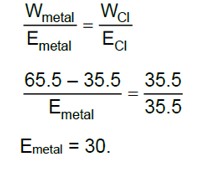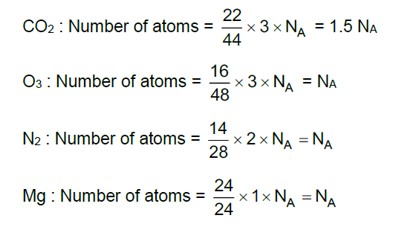In the following questions a statement of Assertion (A) followed by a statement of Reason (R) is given. Choose the correct option out of the choices given below each question.
Assertion (A): The empirical mass of ethene is half of its molecular mass.
Reason (R): The empirical formula represents the simplest whole number ratio of various atoms present in a compound.
(i) Both A and R are true and R is the correct explanation of A.
(ii) A is true but R is false.
(iii) A is false but R is true.
(iv) Both A and R are false
In the following questions a statement of Assertion (A) followed by a statement of Reason (R) is given. Choose the correct option out of the choices given below each question.
Assertion (A): The empirical mass of ethene is half of its molecular mass.
Reason (R): The empirical formula represents the simplest whole number ratio of various atoms present in a compound.
(i) Both A and R are true and R is the correct explanation of A.
(ii) A is true but R is false.
(iii) A is false but R is true.
(iv) Both A and R are false
This is a Assertion and Reason Type Questions as classified in NCERT Exemplar
(i) Both A and R are true and R is the correct explanation of A.
Explanation: The molecular formula gives the actual number of different atoms present in a molecule and the empirical formula gives a simple whole number rati
Similar Questions for you
In the medical entrance test NEET, there can be 1 to 3 questions from this chapter. Some year, the Chemistry section of NEET has only one question from this chapter and in some other years, there can be 3 questions.
The following are the key concepts of this chapter: Compound, Elements, Rules, Law of conservation of mass, Addition and Subtraction, Atomic Mass, Law of multiple proportions, and Molecular Mass.
As the name suggests, the first chapter of the NCERT Class 11 Chemistry introduces various basic concepts of chemistry, such as the definition and importance of chemistry, atomic matter and molecular masses, the mole concept, laws of chemical combination, empirical, stoichiometry, and molecular form
Taking an Exam? Selecting a College?
Get authentic answers from experts, students and alumni that you won't find anywhere else.
On Shiksha, get access to
Learn more about...

Chemistry NCERT Exemplar Solutions Class 11th Chapter One 2025
View Exam DetailsMost viewed information
SummaryDidn't find the answer you were looking for?
Search from Shiksha's 1 lakh+ Topics
Ask Current Students, Alumni & our Experts
Have a question related to your career & education?
See what others like you are asking & answering


